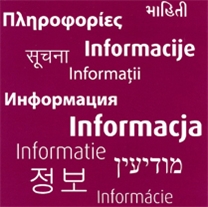Grant Spotlight | January 1, 2008
Share This |
Recipient
|
Contact Web Site: |
||
For library workers across the country, it is a communications quandary that comes through the turnstiles each day: how, as communities and neighborhoods continue to diversify, to assist patrons who speak little or no English.
For librarians in Illinois’ Lincoln Trail Libraries System and beyond, the solution is now just a magenta placard or a phone call away. This, thanks to a pioneering new program that is putting patrons in touch with people who know their language best and can connect them to the information they need.
One part concierge desk, to two parts volunteer United Nations, Lincoln Trail’s PolyTalk program, funded by the Illinois State Library through IMLS's Grants to State Library Administrative Agencies program, is the first of its kind to amass a network of more than 100 interpreters on call any time a library worker needs an extra hand – or voice.
PolyTalk began as an idea three years ago, when longtime Lincoln Trail employee Joe Sciacca noticed something in his travels that troubled him: when visiting libraries abroad, he often had difficulty finding a librarian who could speak English.
Similar problems abounded in American libraries, where multi-lingual speakers made for a tough find – a particular challenge in Illinois, where one in five residents speaks a language other than English at home, and the state’s Latino, Asian, and eastern European communities are its fastest growing.
"There are some people who would like to ask questions, but if you have a mother who would like to find picture books for her children but doesn’t know English, she doesn’t think about going to the library to ask," Sciacca says, adding that many come from countries where libraries are not public, but instead luxuries for the wealthy and intellectual classes. "If the linguistically challenged aren’t getting the library service they deserve, that’s not right. We wanted to do something about that."
Sciacca first looked into hiring a commercial interpreter service for the Lincoln Trail system as a possible fix, but that proved too expensive. Instead, he looked within and outward to the community. Together with colleagues, he began posting announcements in local libraries, at the Mortenson Center for International Library Programs at nearby University of Illinois, and with international student organizations.
"It proved a lot easier than we thought to find people willing to share their language skills," says Michelle Ralston, project coordinator for PolyTalk.
Within a short period, library officials had recruited a volunteer base of more than 75 interpreters, a number that has now shot north of 100, speaking some 40 languages. While this was happening, the Lincoln Trail PolyTalk team went to work putting together what is now known as the PolyTalk Language Kit: a series of laminated cards and folders that enable staffers to engage a patron who doesn’t speak English, determine his or her language, and get the help he or she needs.
Here’s how it works. When a patron who doesn’t speak English walks into the library and seeks help, he is directed to a desk where a PolyTalk-trained employee (there are now more than 300 of them throughout the state) initiates a conversation. Using a magenta placard listing 30 languages, the worker asks the patron to point out his native tongue. From there, the employee is able to pull out a series of cards from the toolkit with basic questions and answers, as well as an information folder about the library and the services available. If that doesn’t work, the employee then places an orange card on the counter explaining that an interpreter is being found by phone.
When Sciacca and colleagues took to building their interpreter database, they asked people to apply over the Internet, entering their names, phone numbers and times of availability, even down to 15-minute increments. Today, a librarian is able to enter the language being sought into a computer and find any number of speakers available at that given time – a list that comprises everyone from library employees, to students, to in one case, a Turkish couple who supply publicity materials to the library.
"What I want these patrons to walk away with is the notion that the library is for them too," Sciacca says. "There shouldn’t be a barrier there just because their language is different. I want them to know that libraries care about that, that we’re all about inclusion."
That principle is now in practice in more than 165 libraries across Illinois, many of them in small, rural, once-homogenous communities, transformed by an influx of migrant workers. In Arcola, for instance, one of the nation’s largest suppliers of corn husk broom bristles, library workers have seen their town’s demographics skew from nearly all-white 20 years ago, to 20 percent Hispanic in just a few short years. It is a source of what Sciacca and Ralston consider many PolyTalk success stories.
"It’s a good example of how communities change and how libraries can change to better serve them," he says.
When an elderly man walked into the Ela Area Public Library speaking only Polish, and gesturing at his shoe with a piece of fabric and a metal ring he was holding, librarian Jennifer Groth was able to immediate track down an interpreter by phone. The man’s query: he was restoring his old military uniform and looking for a local shoe repair shop. Groth was able to direct the patron, and then call the shoe repair shop to let them know he was coming.
"I just want them to walk out of the library feeling like they’ve been served," says Lincoln Trail’s executive director Jan Ison. "I realize libraries across the globe are different, and that people have different perceptions based on their experience in their home countries. But we want them to understand that libraries in this country are safe places, where they can come not just for a book, but also for community information."
As for how many patrons have taken advantage of PolyTalk thus far, that is hard to say, Sciacca concedes. Marketing for the program has been decidedly word-of-mouth, and libraries haven’t yet developed a reporting system to log each time they use the toolkit or call an interpreter.
"This isn’t necessarily a service they are going to need everyday," Ralston says. "But when they do, there is nothing else to replace it."
It is a service that could be offered to a great many more people in the coming years. In addition to the 400,000 patrons in the Lincoln Trail system, and the public and school libraries statewide who’ve adopted it, PolyTalk could soon make its way into at least four other states. So far, Ison says her system is in talks with officials in Connecticut, Nebraska, Georgia, and Ohio about joining the PolyTalk network, themselves. Not only would it heighten the program’s exposure, she says, it could also dramatically expand the system’s corps of volunteer interpreters. Library officials concede they’re thin in some languages (Arabic among them), and given the numbers, there isn’t always an interpreter available at the time one is needed.
"There are 100 different languages spoken in the state of Illinois alone," Ison says. "Our goal would be to get a volunteer in every one of those. But that’s a long ways off. In the meantime, we just want to continue to get more and more people involved, to see the kits used in as many different ways as possible…and to see people getting the information they need."
Sciacca agrees.
"This is a massive volunteer project, and one of our goals is to make sure that when the library calls, someone is available," he says. "A lot of this is a public relations job; that no matter how rural some communities think they are, we are making the point that this is for everyone."
Word is getting out – and not just among communities or the four states looking to adopt PolyTalk. Last year, PolyTalk earned national recognition, as one of six programs nationwide to win a Building Better Communities award from global library technology giant SirsiDynix. The award recognizes libraries for creative and enterprising uses of technology to improve their user technologies.
Ralston sees more big things in the future, as even more states look to add and tap into PolyTalk’s interpreter database. There’s no reason, she says, that other states should have to start from scratch, when there’s already something substantial in place.
"This isn’t such an outside-the-box idea," Ralston says. "It’s just that within our niche, we figured out a way to put together on a larger scale something that just couldn’t be done locally. I kind of feel like we’re the Verizon network in that we just keep growing, except we’re the PolyTalk network."

